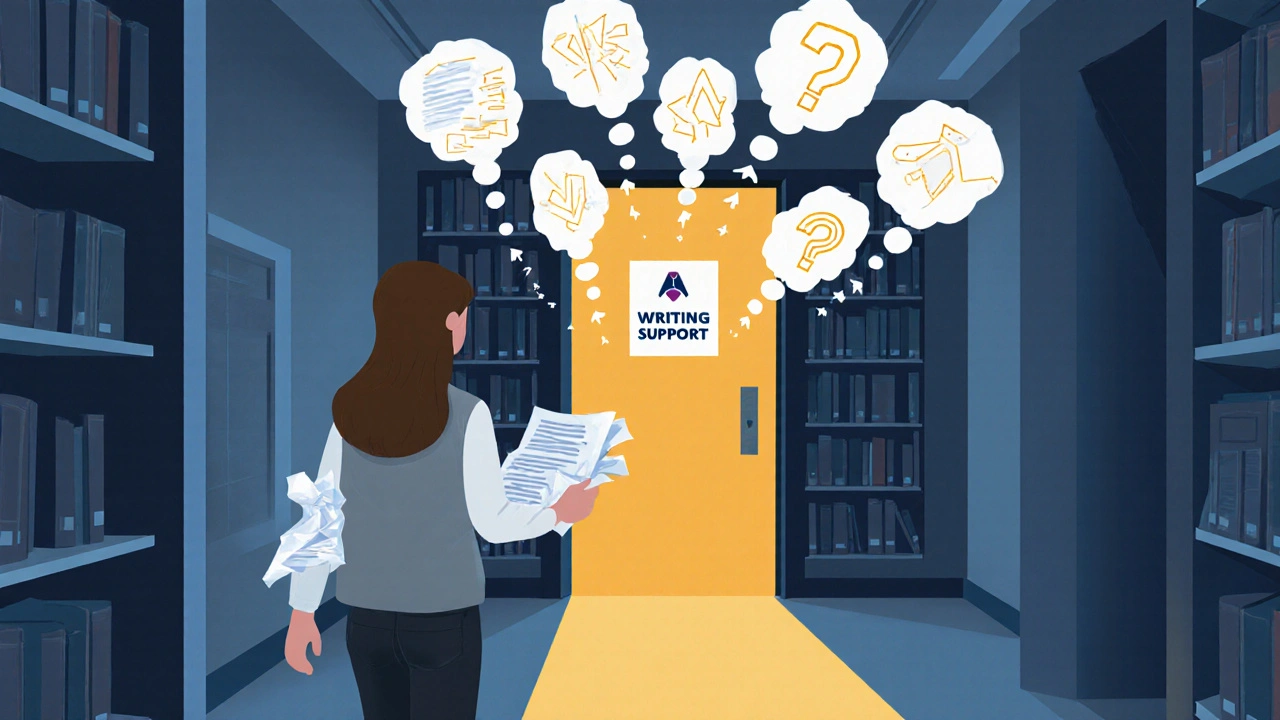
Thousands of students in the UK walk into their university’s writing centre with a half-written essay, a sinking feeling, and no idea where to start. They’re not lazy. They’re not bad writers. They’re just overwhelmed. The truth is, most students don’t know writing centres even exist - or if they do, they think they’re only for people who struggle with grammar. That’s a myth. University writing centres in the UK are free, confidential, and designed for every student, from first-year undergrads to PhD candidates. And they’re one of the most underused resources on campus.
What Exactly Do University Writing Centres Do?
Writing centres aren’t proofreading factories. They don’t fix your essay for you. Instead, they help you become a better writer. Tutors sit with you, ask questions, and guide you through your own thinking. You bring a draft - even a messy one - and they help you clarify your argument, structure your ideas, or figure out why your conclusion feels weak. It’s like having a coach, not a correction tool.
At the University of Edinburgh, for example, tutors are trained to focus on higher-order concerns first: clarity of purpose, logical flow, and academic tone. Only after those are addressed do they look at sentence-level issues. That’s the opposite of what most students expect. You walk in thinking, “Fix my commas,” and you walk out understanding why your thesis needs to be sharper.
These centres also help with specific assignment types. Need help with a literature review? A reflective journal? A lab report? Tutors know the expectations for each. They’ve seen hundreds of them. They don’t give you a template - they help you understand the genre.
Who Can Use Them?
Anyone with a university email. No exceptions. International students? Yes. Students with dyslexia? Yes. Native English speakers who still can’t nail an academic voice? Absolutely. Writing centres don’t judge. They don’t ask for proof of struggle. You just show up.
At King’s College London, nearly 60% of users are international students. Many come because they’ve never written essays in English before. Others come because they’ve been told their writing is “too informal” or “lacks critical analysis.” The tutors don’t tell them to sound more British. They help them sound more academic - in their own voice.
Even top-performing students use them. A 2023 survey by the UK Association of Writing Professionals found that 42% of students who regularly visited writing centres had first-class marks. Not because the centre gave them perfect essays - because they learned how to think critically, structure arguments, and revise effectively.
How to Find Your University’s Writing Centre
Start with your university’s website. Search for “writing centre,” “study skills,” or “academic support.” If that doesn’t work, check the library’s resources page - many writing centres are housed there. Some universities call them “Learning Development Units” or “Academic Skills Teams.” Don’t get confused by the name. Look for services that offer one-to-one appointments.
Most centres have online booking systems. You’ll usually pick a 30- or 45-minute slot. Some, like the University of Manchester, offer drop-in hours for quick questions. Others require advance booking - especially during exam season. Don’t wait until the night before your deadline. Slots fill up fast.
Here’s a quick checklist to find yours:
- Go to your university’s official website
- Search “writing support” or “academic skills”
- Check the library or student services pages
- Look for “book an appointment” or “drop-in hours”
- Call the student union if you’re stuck - they know where everything is
What to Bring to Your Appointment
You don’t need a polished draft. In fact, it’s better if you don’t. Bring:
- Your assignment brief
- Any notes, mind maps, or rough ideas
- A printed copy of your draft - even if it’s just bullet points
- Specific questions: “Does my argument make sense?” “Why does my conclusion feel flat?” “Is this paragraph relevant?”
Don’t bring a list of “errors” you want fixed. That’s not what they do. Instead, focus on your goals. Are you trying to sound more formal? Structure your evidence better? Avoid repetition? Tell them. The tutor will tailor the session to your needs.
One student at the University of Sheffield brought a 10-page draft with no clear thesis. The tutor asked: “What’s the one thing you want your reader to remember after they finish this?” That question changed everything. By the end of the session, she had a thesis, three supporting points, and a plan to rewrite. She got a first.

What Happens in a Typical Session?
It’s not a lecture. It’s a conversation. The tutor reads your work silently first. Then they ask questions:
- “What’s your main point here?”
- “Who are you writing for?”
- “What’s the weakest part of this section?”
You’ll do most of the talking. The tutor listens, takes notes, and helps you spot gaps in logic or unclear phrasing. They might highlight a paragraph and say, “This idea is strong - can you link it to your thesis?” Or they’ll ask you to read your paragraph out loud. Often, you’ll hear the awkwardness yourself.
They won’t correct every typo. But they will point out patterns: “You use ‘very’ six times in this page. Try replacing them with stronger verbs.” Or: “Your citations are all in different styles. Which one does your department want?”
At the end, you’ll get a few actionable tips - not a rewritten essay. Maybe: “Try outlining your next draft using this structure,” or “Watch this 10-minute video on avoiding passive voice.” You leave with tools, not answers.
Common Misconceptions
There are a few myths that stop students from going:
- “It’s only for struggling students.” False. Even students with 70%+ grades use them to push from upper-second to first-class work.
- “They’ll tell me I’m wrong.” No. They help you defend your ideas better. If your argument is weak, they’ll help you strengthen it - not replace it.
- “It’s a grammar fixer.” No. Grammar is the last thing they touch. Focus on ideas first.
- “I’ll get in trouble if I use it.” Absolutely not. Writing centres are confidential. Your tutors don’t report to your professors.
Some students worry about plagiarism. Writing centres don’t write your essay. They help you write it yourself. That’s not cheating - it’s learning.
What If Your University Doesn’t Have One?
Most UK universities do. But if yours doesn’t - or if you’re studying remotely - here are alternatives:
- Check if your department offers writing workshops - many do, especially in humanities and social sciences.
- Use free online resources like the Purdue Online Writing Lab (OWL). It’s not UK-specific, but the principles of academic writing are universal.
- Join a student writing group. Some universities have peer-led groups where students review each other’s drafts.
- Ask your tutor if they can recommend a book or guide. Many have a short list of trusted resources.
There’s also the UK Higher Education Academy’s Academic Writing Toolkit - a free, open-access guide used by dozens of universities. It breaks down essay writing into clear steps with examples from real student work.

When to Go - And When Not To
Best time to go: three to five days before your deadline. That gives you time to revise. Going the night before means you won’t have time to make real changes.
Don’t wait until you’ve failed an essay. Go early. Even if you think your writing is fine. A single session can help you spot subtle issues - like over-reliance on quotes, weak transitions, or unclear terminology.
And don’t think you need to be “ready.” Writing centres thrive on messy drafts. One tutor at the University of Bristol told me: “I’ve never had a student bring a perfect draft. And I’ve never turned anyone away because it was too rough.”
Why It Works
Writing centres work because they treat writing as a process - not a product. Most students think writing is about getting it right the first time. But real writing is about rewriting. Tutors help you see your draft as a starting point, not a final version.
They also reduce anxiety. Many students feel ashamed to ask for help. Writing centres remove that shame. You’re not broken. You’re learning. And that’s exactly what university is for.
It’s not magic. It’s practice. And it’s free.
Frequently Asked Questions
Are university writing centres in the UK really free?
Yes. All university writing centres in the UK are fully funded by the institution and offered at no cost to enrolled students. There are no hidden fees, subscriptions, or charges - even for international students.
Can I use a writing centre for group projects?
Yes. Many centres allow group bookings, especially for team essays or presentations. Just let them know when you book that you’re coming with others. They’ll adjust the session to help with collaboration, division of tasks, and consistent tone across sections.
Do writing centre tutors grade my work?
No. Tutors are not involved in grading. They don’t know your professor, your marking criteria, or your grade. Their only goal is to help you improve your writing process. Your work remains confidential and is never shared with your department.
How often can I visit a writing centre?
There’s no strict limit. Most students visit once or twice per term, but you can book as many sessions as you need. Some students go weekly during major assignments. Others return for feedback on each draft. It’s up to you.
What if I’m shy or nervous about talking to a tutor?
It’s completely normal. Tutors are trained to make you feel at ease. Most sessions start with small talk - “How’s your week going?” or “What’s your topic?” You don’t have to say much at first. The tutor will guide the conversation. Many students say their first session felt awkward - and their third felt like a chat with a friend.
Next Steps
If you’re reading this and you’re a student in the UK, don’t wait. Go to your university’s website right now and find the writing centre. Book your first appointment. Even if you think your essay is fine - you’ll be surprised what you learn. Writing isn’t about talent. It’s about practice. And the people who get the best grades aren’t the ones who write perfectly. They’re the ones who keep revising.